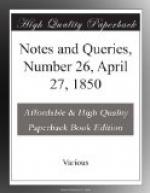Shrew (No. 24. p. 381.).—The word, I apprehend, means sharp. The mouse, which is not the field-mouse, as Halliwell states, but an animal of a different order of quadrupeds, has a very sharp snout. Shrewd means sharp generally. Its bad sense is only incidental. They seem connected with scratch; screw; shrags, the end of sticks or furze (Halliwell); to shred (A.-S., screadan, but which must be a secondary form of the verb). That the shrew-mouse is called in Latin sorex, seems to be an accidental coincidence. That is said to be derived from [Greek: urax]. The French have confounded the two, and give the name souris to the common mouse, but not to the shrew-mouse.
I protest, for one, against admitting that Broc is derived from broc, persecution, which of course is participle from break. We say “to badger” for to annoy, to teaze. I suppose two centuries hence will think the name of the animal is derived from that verb, and not the verb from it. It means also, in A.-S., equus vilis, a horse that is worn out or “broken down.”
C.B.
Zenobia (No. 24. p. 383.).—Zenobia is said to be “gente Judaea,” in Hoffman’s Lexicon Universale, and Facciolati, ed. Bailey, Appendix, voc. Zenobia.
M.
Oxford.
Cromwell’s Estates (No. 24. p. 389.).—There is Woolaston, in Gloucestershire, four miles from Chepstow, chiefly belonging now to the Duke of Beaufort.
C.B.
Vox et praeterea Nihil (No. 16. p. 247., and No. 24. p. 387.).—This saying is to be found in Plutarch’s Laconic Apophthegms ([Greek: Apophthegmata Lakonika]), Plutarchi Opera Moralia, ed. Dan. Wyttenbach, vol. i. p. 649.
Philemon Holland has “turned it into English” thus:—
“Another [Laconian] having plucked all the feathers off from a nightingale, and seeing what a little body it had: ‘Surely,’ quoth he, ‘thou art all voice, and nothing else.’”—Plutarch’s Morals, fol. 1603. p. 470.
W.B.R.
Law of Horses.—The following is from Oliphant’s Law of Horses, &c., p. 75. Will any of your readers kindly tell me whether the view is correct?
“It is said in Southerene v. Howe (2 Rol. Rep. 5.), Si home vend chivall que est lame, null action gist peur ceo, mes caveat emptor: lou jeo vend chivall que ad null oculus la null action gist; autrement lou il ad un conterfeit faux et bright eye.” “If a man sell a horse which is lame, no action lyes for that, but caveat emptor; and when I sell a horse that has no eye, there no action lies; otherwise where he has a counterfeit, false, and bright eye.”
Thus it appears that a distinction is here made between a horse having no eye at all, and having a counterfeit, false or bright one. And probably by bright eye is meant glass eye, or gutta serena; and the words “counterfeit” and “false” may be an attempt of the reporter to explain an expression which he did not understand. Because putting a false eye into a horse is far in advance of the sharpest practices of the present day, or of any former period.




